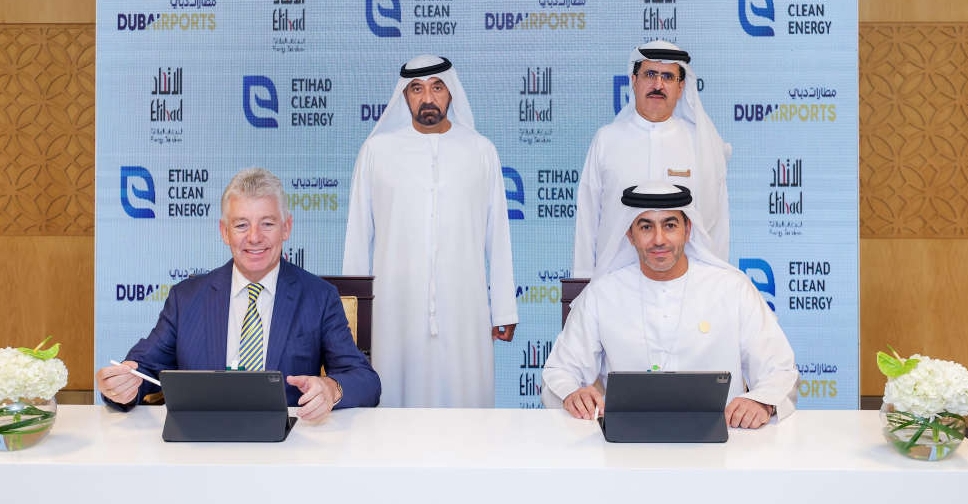Dubai Airports Unveils Ambitious Solar Energy Initiative

In a groundbreaking move for sustainable energy, Dubai Airports has announced a strategic partnership with Etihad Energy Services Company (ESCO), marking the launch of the world’s largest rooftop solar panel installation at an airport. This ambitious project, unveiled during the World Green Economy Summit at the Dubai World Trade Centre, sets a vital precedent for renewable energy initiatives within the aviation industry.
The agreement was signed by Paul Griffiths, CEO of Dubai Airports, and Dr. Waleed Alnuaimi, CEO of Etihad ESCO. Their collaboration is set to revolutionize energy consumption at Dubai International Airport (DXB) and Dubai World Central – Al Maktoum International Airport (DWC) by installing an astonishing 62,904 solar panels across the various terminals and concourses of both airports. Scheduled for completion by 2026, the solar installation is projected to generate approximately 60,346 megawatt-hours (MWh) of energy annually—an impressive feat that illustrates Dubai’s commitment to sustainable innovation.
A Greener Future: Key Benefits and Goals
As the world grapples with the consequences of climate change, the benefits of this solar panel project extend beyond mere energy generation. It is expected to offset a staggering 23,000 tonnes of carbon dioxide (CO2) emissions each year, a reduction that is equivalent to taking approximately 5,000 cars off the road or powering 3,000 homes for a full year. This commitment to cleaner air significantly aligns with global sustainability goals and showcases the potential for large-scale renewable projects in urban settings.
The energy generated will account for about 6.5% of DXB’s power needs and as much as 20% of DWC’s requirements. These figures are a testament to the airports’ long-term vision of adopting cleaner, smarter, and more sustainable operations. Moreover, this initiative builds upon previous successful installations at DXB’s Terminal 2 and Concourse D, where solar energy has already played a crucial role in minimizing energy consumption and emissions.
Leadership Commitment Towards Sustainability
Saeed Al Tayer, Vice Chairman of the Dubai Supreme Council of Energy, Managing Director, and CEO of Dubai Electricity and Water Authority (DEWA), emphasized the critical importance of this initiative in establishing Dubai as one of the most sustainable cities globally. He remarked, “Our roadmap outlines clear targets of achieving 25% of the energy mix from clean energy sources by 2030 and 100% by 2050. We are proactively accelerating our efforts.”
Highlighting the potential for innovation, Al Tayer stated that Dubai aims to surpass its clean energy goals, potentially reaching 27% clean energy capacity as early as 2030. This forward-thinking approach places Dubai on the fast track to achieving its 2050 vision for sustainability, driven specifically by groundbreaking technologies and innovative methodologies.
A Game Changer for the Aviation Industry
For Paul Griffiths, the CEO of Dubai Airports, this project is not just a functional renovation—it is an essential shift in mindset and operation. He stated, “Airports are significant energy consumers, but with that comes tremendous opportunity and responsibility to drive real change. For us, this is not just about installing solar panels; it’s about embedding sustainability into the core of everything we do.”
Griffiths also underscored that every kilowatt obtained from renewable sources pushes the airport closer to reducing its carbon footprint. This project aims to set not only local but also global standards in sustainability practices for airports, transforming them into leaders in green initiatives.
The Bigger Picture: Impact on Dubai’s Economy and Tourism
This ambitious solar initiative is poised to bolster Dubai’s economy significantly. As the UAE moves toward a greener economy, the positive implications extend to increased sustainability-focused tourism as well. Tourists today are more cognizant of their carbon footprint and increasingly seek destinations that prioritize eco-friendly practices. By establishing itself as a leader in sustainable energy, Dubai enhances its reputation as a global tourism hub, ready to meet the demands of an eco-conscious traveler.
Moreover, the aviation sector represents a significant area for growth in renewable energy use. By pioneering this massive solar initiative, Dubai Airports inspires other airports and businesses worldwide to adopt similar strategies, potentially leading to a broader shift towards sustainability in the aviation industry.
Conclusion
Dubai’s commitment to sustainability is boldly reflected in the launch of the world’s largest rooftop solar panel installation at its airports. With the project expected to be fully operational by 2026, the anticipated environmental benefits and energy savings pave the way for a greener future, not just for Dubai but for airport operations globally.
This initiative exemplifies the power of vision and action, proving that significant strides towards environmental sustainability are achievable—paving the way for future generations.
Tags: #UAE #Sustainability #BusinessNews #EconomyNews #EnvironmentNews







